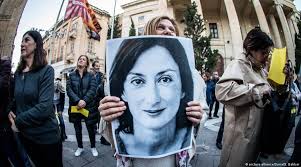#WORLD:
Maltese reporter Daphne Caruana Galizia was killed in a car bomb attack in 2017. Four years later, the EU has pledged to strengthen the safety of journalists. Many, however, feel these promises won’t be enough.
When Daphne Caruana Galizia was murdered on October 16, 2017 in a car bomb attack people were shocked, not only across Europe but around the world.
But the Maltese reporter who was renowned for her investigations into corruption and money laundering wasn’t the only one. In the four years since her death, other colleagues including Jan Kuciak from Slovakia, Giorgos Karaivaz from Greece and Peter de Vries from the Netherlands have also been killed. In Europe — the continent that is considered a relatively safe haven for media professionals.
Julie Majerczak, head of the Brussels office of Reporters Without Borders (RSF), told DW that even though that’s still the case, the situation has been steadily deteriorating in the last couple of years. “And journalists being murdered is only the tip of the iceberg.
According to the European Commission, 900 media professionals were attacked in the European Union in 2020. Some of these attacks were physical, but they also included insults and harassment — especially of women, both offline and online.
Journalists increasingly feeling the pressure
These findings don’t come as a surprise to Manuel Delia. The Maltese investigative blogger and activist who led anti-government protests following Caruana Galizia’s murder recently decided to leave his home country with his family for an undisclosed location.
